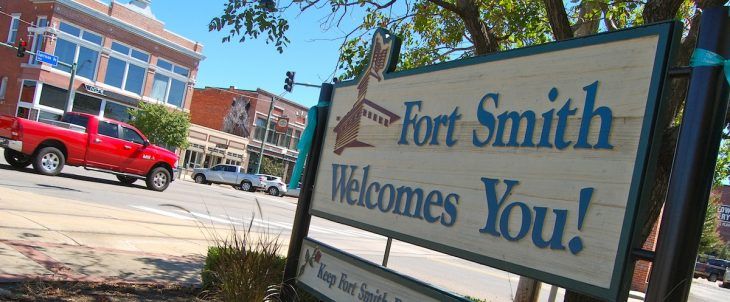Fort Smith faces delay on making case before Arkansas FOIA Task Force
by April 4, 2018 5:59 pm 732 views

The Fort Smith parties involved in a Freedom of Information Act (FOIA) case will have to wait a little longer to make their cases before the newly formed Arkansas FOIA Task Force.
Fort Smith attorney Joey McCutchen confirmed he and Daily & Woods/city attorney Jerry Canfield were unable to make the April 9 docket for the quarterly meetings held in Little Rock, but expected to be added to the next agenda.
Canfield sent a five-page letter to task force chairperson Ellen Kreth on March 30 asking the task force to provide guidance on the definition of what constitutes a public meeting. The city has been dinged twice for holding informal meetings via email — once in a 2004 case brought by Fort Smith resident David Harris and once with the Jan. 5 ruling of Sebastian County Circuit Court Judge J. Michael Fitzhugh in McCutchen’s favor. The case is now on appeal.
In the letter, Canfield wrote that current law, which decides the basis of a meeting through case law, “chills the speech of the governing body,” adding that local officials “overwhelmingly support but do not know how to apply” the law because of the FOIA statute’s ambiguity. Canfield also said the city spends many resources ensuring compliance with FOIA and argued the lack of clarity threatens the First Amendment rights of locally elected officials, who are made to follow more stringent rules than judicial, state, or federal officials.
“The members of local governing bodies do not park their constitutional rights when they enter in to public service,” Canfield wrote. (Link here for a PDF copy of Canfield’s letter.)
In a Jan. 5 ruling, Judge Fitzhugh said a series of emails written in May and August of 2017 between Board members and City Administrator Carl Geffken were in violation of FOIA. The emails centered on Fort Smith Police Chief Nathaniel Clark’s desire to amend rules of the Civil Service Commission (CSC) to allow hiring and/or appointment of officer positions to include external applicants, a decision opposed by the Fraternal Order of Police (FOP) that was allowed to die for lack of motions at the commission’s May 22 meeting.
In the ruling, Judge Fitzhugh ruled in favor of Bruce Wade, McCutchen’s client, noting that “Under the facts of this case the Court concludes that informal meetings subject to the FOIA were held by way of emails. The purpose of which were to either opine or survey the members as to the demise of the CSC and/or acceptance/rejection of a settlement.”
“These are clearly matters that should have occurred in a public setting,” Fitzhugh wrote, adding that the city was “permanently enjoined from conducting public business in this matter without notice.”
As of Jan. 1, 2018, the city had paid $31,000 in legal costs defending the case. McCutchen, in previous contacts with Canfield, said an appeal could cost the city an additional $50,000, not counting any judgment that might be leveled against it. McCutchen’s settlement offer, which was denied prior to the Board’s Feb. 6 meeting, offered to waive his costs and attorney fees with an admission of guilt from the city.
Canfield said he expected the case could be on the docket of the Arkansas Supreme Court as early as this fall. In the meantime, his letter constitutes a major move by the city to get the Arkansas Legislature to clarify the definition of a public meeting. Canfield’s letter points to more than 30 other states that have revised their rules for clarity in the digital age, which brings with it more modes of communication than existed when the statute was first enacted.
McCutchen argues a definition of “‘meeting’ is not only unnecessary but will, in fact, be contrary to open, transparent, and accountable government.” A definition, McCutchen said, would “gut the strongest FOIA law in the U.S.”
“The Arkansas Freedom of Information Act has worked just fine for 50 years. The only amendment we need is for it to apply to legislators on the state level,” McCutchen said.
To help raise awareness, he plans to host a public Transparency in Government Group meeting April 11 from the DoubleTree by Hilton in downtown Fort Smith at 5:30 p.m.
The city of Fort Smith has been subject to more FOIA cases than any other city in Arkansas of similar size, said Daily & Woods attorney Douglas Carson at a recent FOIA training session for the city’s Civil Service Commission.
“I think a large part of the idea that there are so many FOIA cases that come out of Fort Smith is because this is where Joey McCutchen lives,” Carson said. “He files a lot of FOIA cases, and that is his right. That is what lawyers do. But it seriously produces more FOIA cases involving Fort Smith than it does Hot Springs, Fayetteville, Pine Bluff, and other similarly-sized cities. It’s not necessarily because we’re doing something wrong more than other cities. It’s just that we have a legal community that gets us involved in more of that kind of litigation.”
